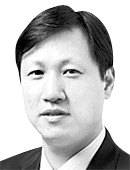A sweet tune that sounds familiar
전체 맥락을 이해하기 위해서는 본문 보기를 권장합니다.
Deputy prime minister and finance minister Choo Kyung-ho echoed the words of the president. In his inaugural address on May 11, Choo vowed to cut the slow-growth of the economy by reviving the dynamism of the private and corporate sector. "Through radical regulatory reform, we will free the chains and sandbags that hamper with creative corporate activities so that companies can eagerly go on with investment and hiring."
A presidential committee on regulatory reform would be pushing the reforms through presidential leadership. How the presidential committee differs from the regulatory meetings under former President Moon Jae-in would have to be seen. The work requires rigorous will, as Yoon ordered his secretaries "to work until the soles of your shoes wear down."
이 글자크기로 변경됩니다.
(예시) 가장 빠른 뉴스가 있고 다양한 정보, 쌍방향 소통이 숨쉬는 다음뉴스를 만나보세요. 다음뉴스는 국내외 주요이슈와 실시간 속보, 문화생활 및 다양한 분야의 뉴스를 입체적으로 전달하고 있습니다.

Kim Won-bae The author is an economic and industry news director of the JoongAng Ilbo.
“The history of mankind shows that prosperity and abundance bloomed where there was freedom in political rights and on markets,” said Yoon Suk-yeol in his inaugural address on May 10, which mentioned “freedom” 35 times.
Yoon has been a decisive champion of market economics. While campaigning at a National Pension Service outpost in Jeonju, North Jeolla, he vowed to lift all regulations possible so that people and companies as well as foreign nationals and corporations can freely make money in this country.
Deputy prime minister and finance minister Choo Kyung-ho echoed the words of the president. In his inaugural address on May 11, Choo vowed to cut the slow-growth of the economy by reviving the dynamism of the private and corporate sector. “Through radical regulatory reform, we will free the chains and sandbags that hamper with creative corporate activities so that companies can eagerly go on with investment and hiring.”
All governments have made ambitious promises to do away with regulations at their starts. President Lee Myung-bak vowed to remove utility poles that get in the way of big trailer trucks. His successor Park Geun-hye promised to “pick out the thorns” hurting companies.
President Moon Jae-in canceled a second meeting on regulatory reform in June 2018 just hours before the meeting was to be held, finding few new ideas. He made an order to come up with “tangible results” as “regulatory reforms without speed would only stop in rhetoric.”
But companies find that little has changed. According to a survey of 500 top companies by the Federation of Korean Industries on May 9, only 24.6 percent answered they expected deregulation progress under the new government, while 24 percent had no expectations and another 51.4 percent bore “average” expectations. The Yoon government chants freedom, but companies say they won’t be fooled again.
Reforming regulations cannot be easy. The need for reform suggests that regulations are bad. But each regulation has a cause. Most are designed with benign intentions. Regulations around the capital region are one. If authorities allow companies to build a factory in the capital region, other regions could argue favoritism.
Government officials would not like to invite the burden. There must be a system where conflicts of interests are mediated and resolved. Regulatory reform can only be spearheaded through presidential will. If the private sector does not regain vitality, there is no future for the Korean economy.
In the book “Economic Policy Agenda 2022” co-authored by five former senior economy-related government officials, one of the writers — former senior presidential secretary for economy Choi Sang-mok — in the preface wrote, “The president cannot oversee all economic affairs. That cannot be possible.
Recruiting able economic expert as a minister with full authority in economic affairs also cannot be desirable. There are polices that can only be pushed with presidential leadership.”
Yoon has started his presidential term in a new office in Yongsan. Even many on the conservative side have protested the hasty move out of the Blue House. But Yoon believed once he moved into the Blue House, it would be hard to move out. Only an elected president can make such a bold decision.
The relocation will cause problems. But in the longer run, the public opening of the Blue House could bring a huge economic effect. As he has returned the presidential palace to the public, he must let businesses freely explore their potential through sweeping deregulation.
But reforming regulations cannot be done as swiftly as a presidential office relocation. There must be a system to back presidential decisions. The presidential transition committee has named enhancement of corporate vitality through reform in regulatory systems as one of the 110 state tasks.
A presidential committee on regulatory reform would be pushing the reforms through presidential leadership. How the presidential committee differs from the regulatory meetings under former President Moon Jae-in would have to be seen. The work requires rigorous will, as Yoon ordered his secretaries “to work until the soles of your shoes wear down.”
Copyright © 코리아중앙데일리. 무단전재 및 재배포 금지.
- Terraform Labs shuts its blockchain after collapse of Luna
- Actor Kim Seon-ho to return to the stage in 'Touching the Void' on July 8
- At Hanwha Aerospace, it is rocket science, gimbal mount and all
- Rhee Ken denies claims a cameraman follows him around in Ukraine
- Premier League top scorer turns into two-horse race
- Late Korean actor Kang Soo-youn laid to rest
- [CELEB] Miyawaki Sakura doesn't need three chances
- [FICTION VS. HISTORY] The fact and fiction in ‘Mr. Sunshine’ : Historical sweep is captured but some anachronisms and motiva
- With idols debuting as young as 14, experts say it's time for action
- The tragic fate of Joseon women